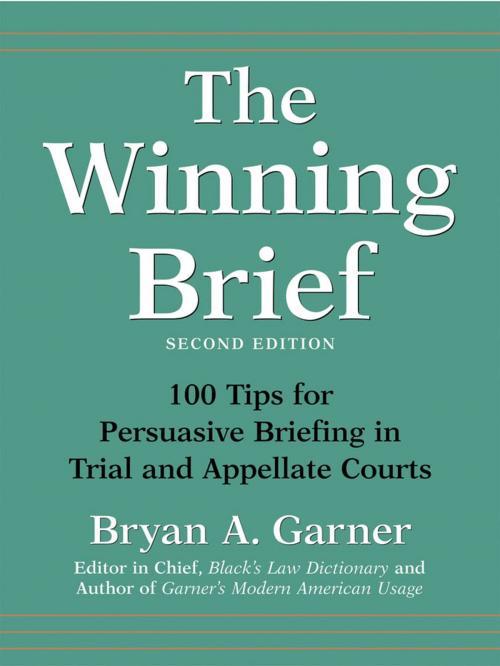The Winning Brief: 100 Tips for Persuasive Briefing in Trial and Appellate Courts
Nonfiction, Reference & Language, Law, Dictionaries & Terminology, Legal Profession| Author: | Bryan A. Garner | ISBN: | 9780199826629 |
| Publisher: | Oxford University Press | Publication: | February 13, 2004 |
| Imprint: | Language: | English |
| Author: | Bryan A. Garner |
| ISBN: | 9780199826629 |
| Publisher: | Oxford University Press |
| Publication: | February 13, 2004 |
| Imprint: | |
| Language: | English |
Good legal writing wins court cases. It its first edition, The Winning Brief proved that the key to writing well is understanding the judicial readership. Now, in a revised and updated version of this modern classic, Bryan A. Garner explains the art of effective writing in 100 concise, practical, and easy-to-use sections. Covering everything from the rules for planning and organizing a brief to openers that can capture a judge's attention from the first few words, these tips add up to the most compelling, orderly, and visually appealing brief that an advocate can present. In Garner's view, good writing is good thinking put to paper. "Never write a sentence that you couldn't easily speak," he warns-and demonstrates how to do just that. Beginning each tip with a set of quotable quotes from experts, he then gives masterly advice on building sound paragraphs, drafting crisp sentences, choosing the best words ("Strike pursuant to from your vocabulary."), quoting authority, citing sources, and designing a document that looks as impressive as it reads. Throughout, he shows how to edit for maximal impact, using vivid before-and-after examples that apply the basics of rhetoric to persuasive writing. Filled with examples of good and bad writing from actual briefs filed in courts of all types, The Winning Brief also covers the new appellate rules for preparing federal briefs. Constantly collecting material from his seminars and polling judges for their preferences, the second edition delivers the same solid guidelines with even more supporting evidence. Including for the first time sections on the ever-changing rules of acceptable legal writing, Garner's new edition keeps even the most seasoned lawyers on their toes and writing briefs that win cases. An invaluable resource for attorneys, law clerks, judges, paralegals, law students and their teachers, The Winning Brief has the qualities that make all of Garner's books so popular: authority, accessibility, and page after page of techniques that work. If you're writing to win a case, this book shouldn't merely be on your shelf--it should be open on your desk.
Good legal writing wins court cases. It its first edition, The Winning Brief proved that the key to writing well is understanding the judicial readership. Now, in a revised and updated version of this modern classic, Bryan A. Garner explains the art of effective writing in 100 concise, practical, and easy-to-use sections. Covering everything from the rules for planning and organizing a brief to openers that can capture a judge's attention from the first few words, these tips add up to the most compelling, orderly, and visually appealing brief that an advocate can present. In Garner's view, good writing is good thinking put to paper. "Never write a sentence that you couldn't easily speak," he warns-and demonstrates how to do just that. Beginning each tip with a set of quotable quotes from experts, he then gives masterly advice on building sound paragraphs, drafting crisp sentences, choosing the best words ("Strike pursuant to from your vocabulary."), quoting authority, citing sources, and designing a document that looks as impressive as it reads. Throughout, he shows how to edit for maximal impact, using vivid before-and-after examples that apply the basics of rhetoric to persuasive writing. Filled with examples of good and bad writing from actual briefs filed in courts of all types, The Winning Brief also covers the new appellate rules for preparing federal briefs. Constantly collecting material from his seminars and polling judges for their preferences, the second edition delivers the same solid guidelines with even more supporting evidence. Including for the first time sections on the ever-changing rules of acceptable legal writing, Garner's new edition keeps even the most seasoned lawyers on their toes and writing briefs that win cases. An invaluable resource for attorneys, law clerks, judges, paralegals, law students and their teachers, The Winning Brief has the qualities that make all of Garner's books so popular: authority, accessibility, and page after page of techniques that work. If you're writing to win a case, this book shouldn't merely be on your shelf--it should be open on your desk.















